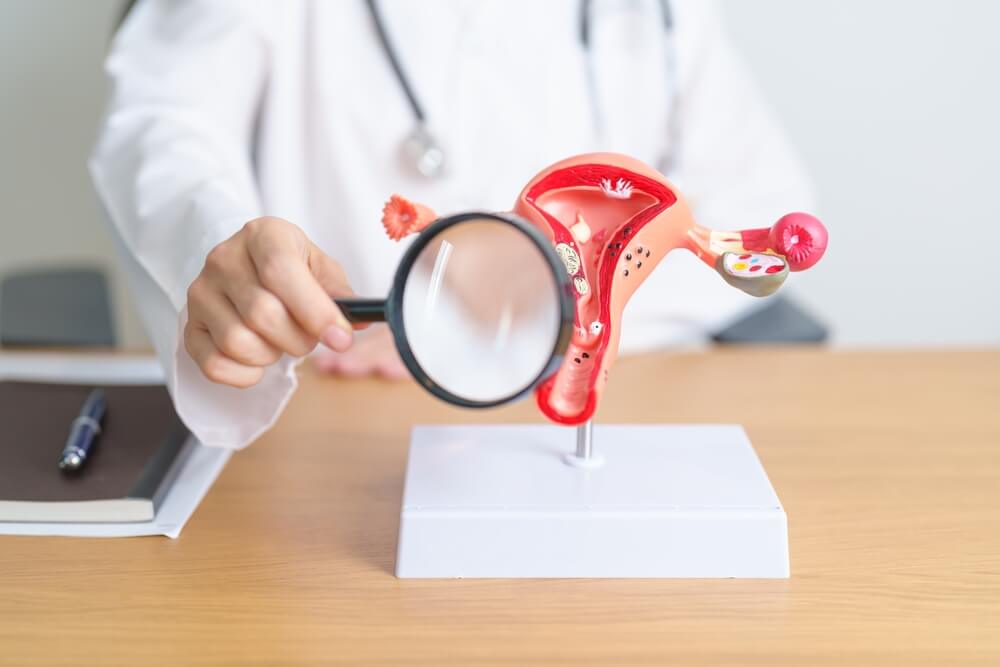Your period is irregular. There is unwanted hair growing in unwanted places. You seem to be gaining weight in your abdominal area.
You may have PCOS.
Polycystic ovary syndrome (PCOS) is a genetic, reproductive, metabolic, and hormonal disorder affecting 6-12% of women of childbearing age. Interestingly, PCOS has nothing to do with cysts on your ovaries.
Though the exact cause of PCOS is unknown, several factors such as excess insulin and androgen seem to play a role. PCOS generally runs in families, but some of our patients have no family history.
While there is no cure for PCOS, your symptoms can be successfully treated. The key is recognizing the symptoms, scheduling a visit to your OB-GYN, and seeking treatment.
Symptoms of PCOS
The classic signs of PCOS include:
- absent or irregular periods
- excessive hair growth, usually in unwanted areas
- infertility
- weight gain
- oily skin or acne
How Is PCOS Diagnosed?

Here is the tricky part of diagnosing PCOS. Not all women with PCOS have irregular periods. Not all have unwanted hair or acne. And there is no one test that can provide you with a definitive answer.
After an initial discussion of your medical history and a physical exam, your OBGYN may order a series of blood tests to check your hormone levels and an ultrasound to confirm the diagnosis. A several medical conditions can have similar symptoms and must be ruled out before a diagnosis of PCOS may be made.
PCOS Treatment Options
Just like there’s no single PCOS test to diagnose it, there’s no single solution for every patient. Not every woman responds well to the PCOS medication; some women respond well simply to lifestyle changes.
That is why treatment for PCOS generally includes a combination of general lifestyle changes and medications targeted to address specific issues.
PCOS Nonmedication Treatment Options
Here are our four top lifestyle modification recommendations:
Promote Healthy Weight Loss
Not all women with PCOS have a weight problem. But for those women who are overweight, losing weight can offer benefits including reducing the risk of diabetes, infertility, and heart disease.
Since many women with PCOS are also diagnosed with insulin resistance, your OBGYN may recommend eating a diet low in sugar and fat and high in fiber which helps control your blood sugar levels. Eliminating soda and juice, as well as refined carbohydrates can also help with weight loss and blood sugar levels. Since the most effective diet plans are ones that incorporate your preferences as well as the physician’s recommendations, a consultation with a dietitian can be very helpful to maximize the benefits.
Try an Anti-Inflammatory Diet
It’s not just the insulin resistance and hormonal imbalance that are typical PCOS complications; chronic low-grade inflammation can also play a role. While diet modifications won’t totally eliminate inflammation, they have been shown to reduce it.
The anti-inflammatory diet was designed to include foods such as fish, nuts, olive oil, and legumes and reduce the intake of foods that can trigger inflammation like red meat. It focuses on foods with a low glycemic index but plenty of fiber and nutrients. Fish and poultry, green vegetables, fruits like berries and apples, and chia seeds are some of the foods you want to include in your diet. Green tea is often recommended because it contains antioxidant and anti-inflammatory compounds. What that means is that green tea can be effective at decreasing stress, improving insulin activity, and lowering the risk of heart disease.
Exercise Regularly
There are so many benefits of exercise. It helps you lose weight, build muscle mass, and burn calories which can all help with insulin resistance. And exercise reduces stress which can exacerbate PCOS.
Minimize Stress Levels
Stress is part of our daily life. However, consistently high levels of stress can impact our health. Not only can stress trigger inflammation in the body, but it can also impede the proper functioning of various reproductive systems. For instance, it’s not uncommon for women to miss their periods during times of heightened stress. When we are hyper-stressed, our body can also release an excess of testosterone which can lead to insulin resistance and Type-2 diabetes.
Stress management can be beneficial and is very individualized. For some, practicing yoga and meditation has been found to reduce depression and improve flexibility. For others, any kind of exercise can be extremely beneficial. Of course, professional therapy is an excellent option when stress and anxiety become overwhelming.
PCOS Medication Options
The combination of diet, exercise, and stress management can help reduce the symptoms of PCOS. We have seen it firsthand in our practice. But medication is often needed to ameliorate specific symptoms.
Here are the most common symptoms of PCOS and the medications we often prescribe to treat those symptoms:
Absent or Irregular periods

Hormonal birth control is effective in treating some of the symptoms of PCOS. Specifically prescribed for women who do not plan to get pregnant, the combination of estrogen and progestin is given to lower androgen levels and regulate menstrual cycles. Taking hormonal birth control pills has the added benefit of reducing women’s risk of developing endometrial and ovarian cancer.
However, hormonal birth control has side effects which is why a medical history is an important part of developing your treatment plan.
Excessive Hair Growth in Unwanted Places
Some types of combined oral contraceptive tablets have been found to reduce unwanted hair by lowering androgen levels. Spironolactone is often prescribed together with birth control pills since it blocks the production of male hormones when taken in higher doses. The topical cream eflornithine has also proven to be effective in the treatment of excess hair growth related to PCOS.
Infertility
If you are planning a family, here is the good news. PCOS does not mean you can’t get pregnant. And if you are experiencing infertility, it can be treated with a combination of lifestyle changes and medications. Clomiphene, an ovulation stimulant, is the most commonly prescribed medication and is generally the primary medication of choice.
Metformin, an insulin-sensitizing drug used to treat type 2 diabetes, is sometimes prescribed for women with PCOS. Additionally, Letrozole, often used to treat certain types of breast cancer, is sometimes prescribed off-label instead of clomiphene.
PCOS is a very complex disorder. While it is common in women of childbearing age, it may be difficult to diagnose. But it is treatable. Whether you need to control your sugar levels, restore ovulation, start a family, or reduce the incidence of acne or excess hair growth, the OBGYNs and nurse practitioners at South Miami OB-GYN Associates have the expertise to individualize your treatment plan and restore your quality of life.
Click HERE to schedule your appointment online today at either our South Miami or Downtown Doral office.




